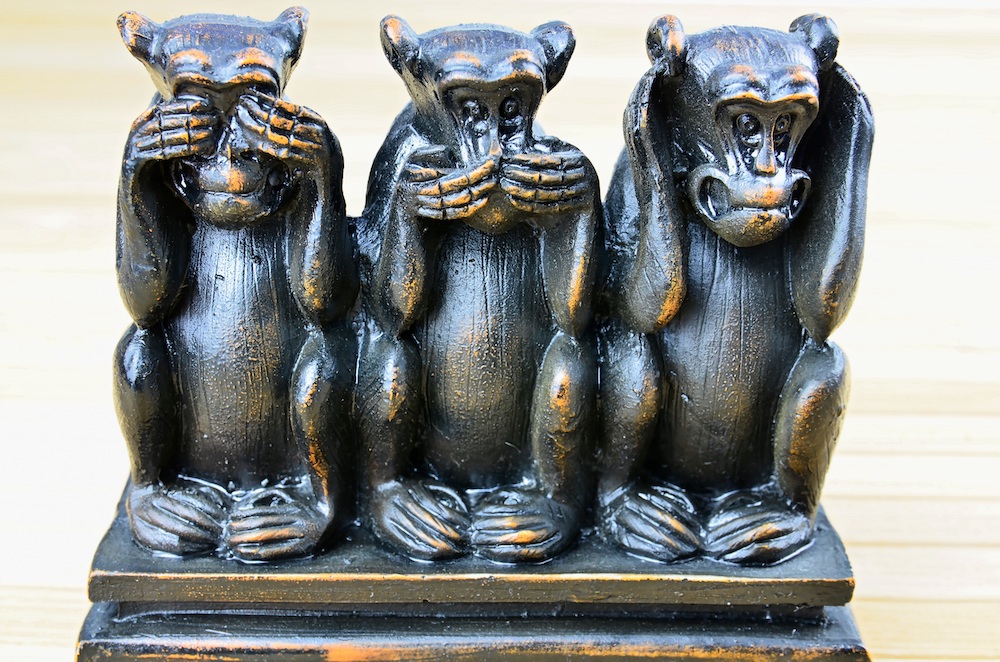
(Pixabay/Robert Fotograf)
Three sculpted monkeys sit, each responsibly covering eyes, ears or mouth. Wordlessly, they depict a Confucian teaching: "See no evil, hear no evil, speak no evil." That counsel may contribute to a peaceful life, but it doesn't fit the tradition of Jesus and Ezekiel.
Let's start with Ezekiel. Pity this poor prophet! Perhaps his greatest burden was the fact that, unlike the monkeys, he had eyes to see, ears to hear, and a voice with which to speak in the name of God. God had appointed Ezekiel as watchman over the house of Israel. Ezekiel wasn't called to be a sentry warding off marauders. That would have been easy. No, Ezekiel's much more arduous mission was to protect his people from the evil in their own community, the thankless task of saving people from themselves.
The prophet who has received the costly blessing of sharing the concerns of God's heart acts like someone so impelled by divine beauty that she or he cannot be idle while people defile creation or debase others. Prophets denounce sin because they themselves are offended and they are painfully aware that silence equals complicity.
People often think of the prophet as a naysayer like the cartoon character who carries a sign proclaiming, "The end is near!" but says nothing about what people should do next. Today's readings portray prophets as people grounded in hope. Prophets recognize evil for what it is: a toxic degradation of what can and should be. The prophet names evil in order to reveal the alternative. The prophet of today's Scriptures has a task like that which Langston Hughes assigned to artists when he said, "Perhaps the mission of an artist is to interpret beauty to people — the beauty within themselves."
God warned Ezekiel that if he didn't speak out, he would be responsible for the fate of evil people. Ezekiel's vocation was not to denounce sin, but to save sinners. Genuine prophecy is motivated by love: love of God's creation and God's people, the offended and the offenders alike.
In today's Gospel, Jesus outlines his methodology for dealing with community members who perpetrate evil. He proposes a four-step, incremental approach to call members of the community to amend their ways, beginning with a one-to-one conversation about the issue, additional witnesses are called in if necessary, and then going to a synod, or formal gathering of the Christian community. If even the third step fails to bring the person around, the community must take a public stand and declare that the person refuses to be in communion of mind and heart with them.
Jesus designed this pedagogy to bring people back to community. It demands immense integrity on the part of those who initiate it and the community that moves it forward. Jesus is teaching us that when someone is doing us wrong, our responsibility is to try to win that person over. Put in starkly simple terms, Jesus says, "When someone offends you, do everything in your power to help him or her." In Jesus' approach, our focus belongs on the person, not the offense. He wants us to be concerned that a choice for evil is ultimately as detrimental to the evildoer as it is hurtful to the community. He teaches that we are responsible to try to save the sinner.
Advertisement
This week, Christians throughout the world begin our annual celebration of the Season of Creation (Sept. 1-Oct. 4). This year, unlike ever before, we are confronting the interrelated challenges of environmental crisis, institutionalized racism and the COVID-19 pandemic. Pope Francis suggests that the Spirit may be working uniquely through this trifecta. The addition of COVID-19 to the crises of Earth and relationships has proven that everyone on Earth is intimately connected. This leads us to understand these three crises as intertwined pandemics that threaten us all and endanger our common future.
Like the exile for Israel, COVID-19 combined with climate change and our growing awareness of systemic racism may be a blessing in disguise offering us a graced, perhaps last, chance to change the course of our history. The evils facing us are global rather than personal. Our response must be tailored to the need. Whether we start by addressing health, racism or climate, the others will come along in the wake.
It's time to open our eyes and ears so that we can assume our responsibility and speak in the name of God on behalf of creation and the people of the Earth. Ezekiel reminds us of our responsibility, and Jesus has promised to be with us in the process. The moment has come to remember that we are Christians, people baptized to be prophets not blind, deaf and silent sculpted monkeys.
[St. Joseph Sr. Mary M. McGlone serves on the congregational leadership team of the Sisters of St. Joseph of Carondelet.]
